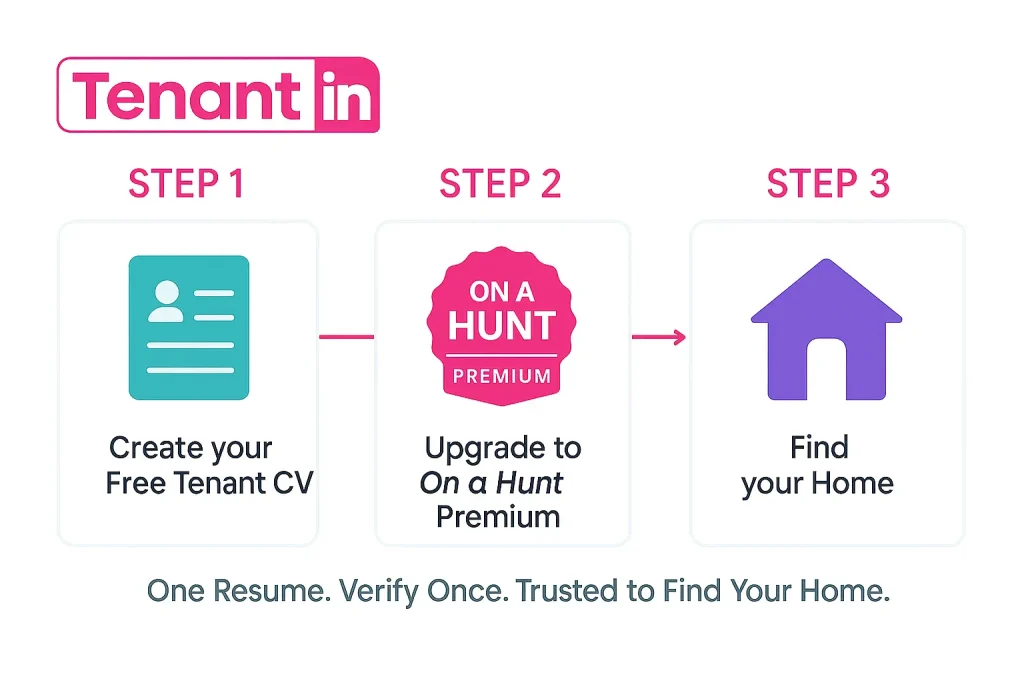Moving to Dublin for your studies? You’re not alone—and that’s exactly the challenge. Thousands of students arrive each year, all looking for safe, affordable accommodation. With limited supply and high demand, renting in Dublin can feel overwhelming. But don’t worry—there are ways to speed things up.
At Tenantin.ie, we help renters—including students—build a strong tenant profile, showcase their rental history, and get noticed faster by landlords. Whether you’re a local student or coming from abroad, this guide will show you how to find a room in Dublin—quickly and smartly.
1. Build a Professional Tenant Resume First
Before you even start messaging landlords, get your documentation ready. A complete tenant resume makes a huge difference—it shows you’re serious and organised.
At Tenantin.ie, you can build your tenant profile for free by adding:
- Personal info (name, age, contact details)
- Rental history (if any, even if just a student hall)
- Student status (proof of enrolment, college ID)
- Employment or income info (part-time job, student grant, parental support)
Your resume is instantly downloadable and shareable with private landlords. The quicker they see your info, the faster they can offer a viewing.
2. Sign Up for “On a Hunt” to Save Time
Manually checking property websites and Facebook groups can be a full-time job. That’s why Tenantin.ie offers “On a Hunt”, a premium feature that:
- Sends you daily alerts from listings across Facebook groups, rental sites, and niche platforms
- Automatically sends enquiries on your behalf
- Assigns you an account manager to guide your search
- Promotes your resume to landlords on FindQo.ie—so they come to you
It’s the smart shortcut to securing a room fast—especially during high-demand months like August and September.
3. Start Searching Early and Set Alerts
The earlier you start, the better your chances. Many landlords list properties 3–6 weeks before they’re available. Begin looking in July or even June if you’re starting in September.
Pro tips:
- Use location-based alerts (focus on your campus or transport links)
- Include keywords like “student friendly”, “bills included”, or “single room”
- Stay logged in to your Tenantin account to manage alerts
4. Be Quick and Polite in Your Messages
When a room is posted, hundreds may apply within hours. Here’s how to stand out:
- Respond quickly
- Keep your message short and respectful
- Attach your tenant resume
- Mention your study programme and college
For example:
“Hi, I’m Sophie, a first-year Trinity student from Cork. I’m tidy, reliable, and looking for a single room from August. My resume is attached. Thanks for considering me!”

5. Ask Your College for Help
Most Irish universities and colleges have accommodation offices that:
- Offer listings or referrals to trusted landlords
- Connect students with each other for shared housing
- Share housing boards or WhatsApp groups
Some also partner with platforms like Tenantin.ie to help students manage their rental journey more efficiently.
6. Join Student Housing Groups (Carefully)
There are plenty of Facebook groups for student rentals in Dublin, but beware of scams. Always:
- Verify the listing (reverse search the images if needed)
- Never pay a deposit before viewing (or verifying identity if remote)
- Use platforms like Tenantin or your college’s portal to confirm listings
With “On a Hunt”, Tenantin filters out fake or low-quality listings and only sends you verified ones that match your preferences.
7. Consider Short-Term First, Then Switch
If you can’t find the perfect place straight away, look for a short-term let:
- Student hostels
- Airbnb monthly discounts
- Temporary student housing
Once you’re in Dublin, it’s much easier to attend viewings and move into a long-term rental with your tenant profile already in hand.
8. Share with Other Students
Splitting rent in a shared house is one of the quickest ways to find accommodation. Use:
- College forums or social media groups
- WhatsApp groups for shared listings
Being flexible with location or budget can really speed things up.
9. Stay Organised
Keep track of:
- Who you messaged
- Which rooms you’ve applied to
- When your move-in date is
Using Tenantin’s dashboard or even a simple spreadsheet can prevent confusion and missed opportunities.
10. Stay Positive and Persistent
It might take a few days—or even a few weeks—to secure a room in Dublin. Don’t get discouraged. The key is to:
- Stay proactive
- Keep your documents ready
- Use tools that do the heavy lifting (like Tenantin’s resume builder and “On a Hunt”)
Most students do find housing—but the ones who plan ahead and present themselves well always get there faster.
Final Tip: Start with Tenantin.ie
Tenantin.ie is built with students in mind. Our tools are free to use, secure, and help you stand out in a crowded market. Whether you’re a first-year student or returning for your final year, we’re here to make your rental journey smoother and faster.
Frequently Asked Questions
What is the best time to start looking for student accommodation in Dublin?
It’s advisable to start searching for accommodation at least three months before your course begins. This allows you ample time to explore various options and secure a place before the rush begins.
What should I budget for renting a room in Dublin?
Renting a room in Dublin can vary significantly depending on the location and amenities. Typically, you might find prices ranging from €500 to over €900 per month. Always factor in additional costs such as utilities and internet when budgeting.
Where can I find listings for rooms available in Dublin?
You can explore listings on platforms like tenantin.ie, which offer up-to-date information on available rooms specifically tailored for students. This platform can help streamline your search and connect you with potential landlords quickly.
What documents do I need to secure a room?
Landlords usually require proof of identity (such as a passport or national ID), proof of enrollment at your university, and sometimes references from previous landlords or character references. It’s helpful to have these documents ready to speed up the process.
How can I increase my chances of getting a room quickly?
To improve your chances, be responsive and flexible with viewings, have your documents ready, and be prepared to commit if you find something suitable. Also, consider broadening your search area slightly to include less central locations where competition may be lower.
Are there any student-specific accommodations available?
Yes, many purpose-built student accommodations offer rooms with facilities like study areas, common rooms, and sometimes catering options. While these can be more expensive, they offer convenience and often include utilities in the rent.
How do I verify if a listing is legitimate?
Always verify the legitimacy of a listing by visiting the property in person before making any payments. Be cautious of deals that seem too good to be true and avoid sending money without seeing the property first.
Can I negotiate rent prices with landlords?
While some landlords might be open to negotiation, especially if you’re signing a longer lease or paying upfront, this isn’t always the case in high-demand areas like Dublin. It’s worth asking but manage expectations accordingly.
What are my rights as a tenant in Dublin?
As a tenant, you have rights regarding privacy, maintenance of the property, and receiving notice before any rent increase or eviction. Familiarize yourself with tenant rights via resources like Threshold or Citizens Information Ireland.
Is it possible to share accommodation with other students?
Yes, sharing accommodation is common among students as it helps reduce costs and provides companionship. If you’re open to sharing, clearly communicate your preferences early on during your search.







